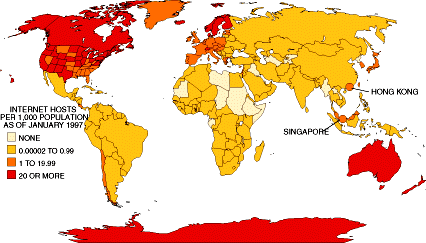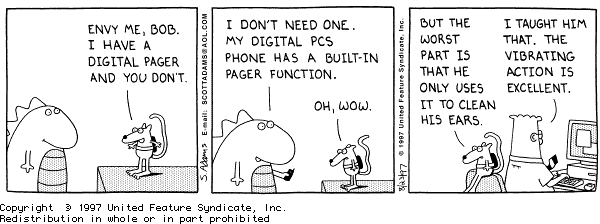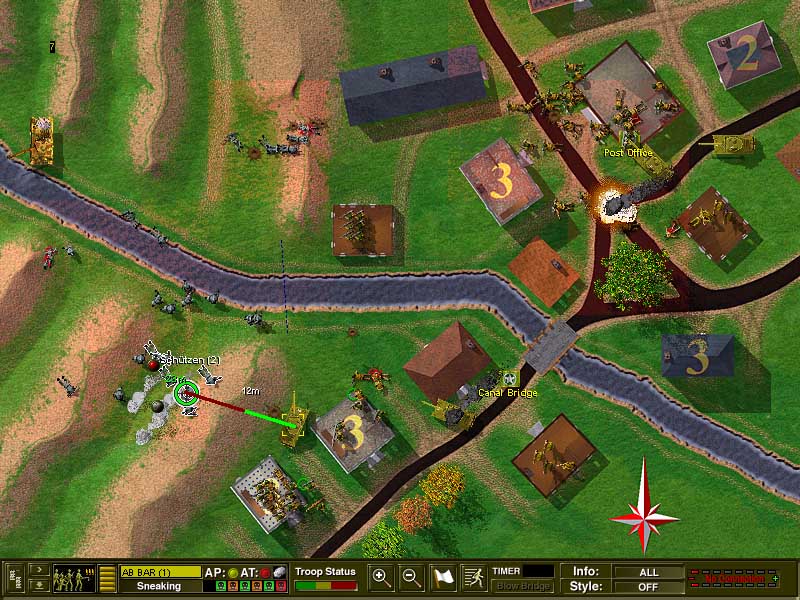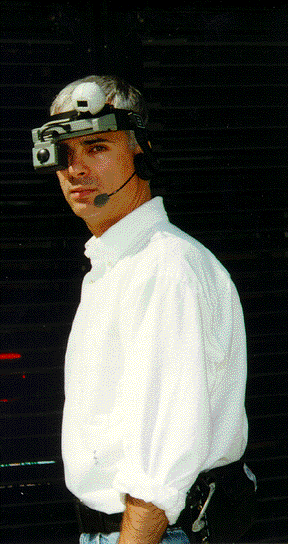Who is the computer generation? It is not the much publicized-about generation X, vaguely defined as people born after 1960 by the marketers. To us in this age-group, computers are something new and interesting. We still remember the Sinclair ZX-81, the Commodore VIC 20 and the Macintosh Plus. Computers and information technology is something that appeared during our youth before our eyes, but except for some enthusiasts they were not in common use until recently (the early 90's or so).
On the other hand, the real computer generation, born in the 80's, has grown up with computers in the home. It is the first generation who has had access to computers all their lives and take them for granted.
SAN JOSE, Calif. (Reuter) - The number of personal computers connected to the Internet will rise 71 percent this year to 82 million, driven by demand by businesses to stay in touch with their customers, a report by a market researcher said Wednesday.http://www.yahoo.com/headlines/970820/wired/stories/computers_1.html
(photshoppa)
Newsgroups: rec.humor.funny Subject: The computer generation Keywords: computer, true, chuckle Date: 31 Jul 91 23:30:05 GMT My brother claims that this morning he heard his 5-year-old and his 3-year-old in the bathroom together and eavesdropped on their conversation: Little brother: What do I do now? Big brother: Throw the toilet paper in the toilet. Little brother: Like this? Big brother: Yeah. Little brother: Now what? Big brother: Hit "ENTER". Little brother: "ENTER"? Big brother: I mean "flush".This is creating a generation that is used to interactive systems, communications and computers. Just as most people born after 1950 take the telephone for granted and gladly chat for hours about nothing in particular (a habit which would have horrified their parents), the computer generation takes the computer for granted and don't see any reason to award it any more respect than any other household appliance.
The technological details doesn't really matter to them, what is important is how the systems can be made to serve their purposes. What the computer generation want is systems that do what they want without being obtrusive, an universal interface to the information they take for granted. When this link is broken, the loss is felt strongly. The computer generation could just as well be called the cellular phone generation - access anywhere, anytime; while older people struggle with developing social norms to handle the use of cellular phones the younger generations have already adapted to them.
As anyone who has played with game-addicted youngsters knows, they often have extraordinary semiotic skills. Children socialised with television and film are more used to dealing with dynamic visual change." At some things, it seems, our kids are destined to be smarter than us. Patricia Greenfield in Mind and Media (Harvard University Press) http://www.mcs.mq.edu.au/Staff/mwark/warchive/Australian-HES/tech-video-games.htmlComputer games are a new phenomenon, not similar to any previous play activity. Just like all games played by children, they serve to train new skills. What is especially interesting in the context of this conference is of course the popularity of strategic or tactical games, as well as the fast development of better simulation environments. It seems that as the graphics and interfaces improve, a wider and wider audience has begun to play strategy games. Typical examples are Westwood's Red Alert,
http://www.westwood.com/games/redalert/ Microsoft's Close Combat
http://www.microsoft.com/games/kickbutt/ and Interactive Magic's Harpoon
http://www.imagicgames.com/harpoon.dir/harpoon.html
"BTW, I never use nuclear weapons, they are useless, at least to reach victory conditions in Harpoon." Seal (128.197.181.157)
segmenten, intenr splittring
A few years ago, a whole industry was founded--and then foundered--on the expectation of rapid adoption of personal computers in the home. A decade later, it's finally happening, and the computers are bringing modems with them. Meanwhile 93 percent of TVs have been enhanced with cable, VCRs, or game systems. The long-expected battleground between the television set and the personal computer is now ready for combat. The most disturbing news in the report is the evident gap--becoming a chasm--in electronic sophistication between those with greater and lesser education. The "know versus know-not" division in America is real and growing. It wasn't a problem with TVs, but it is with computers and modems. http://www.gbn.org/BookClub/Technology.html
not antiauthoritarian, unauthoritarian no confidence in authorities x-files, conspiracy theories reveals views prevalent. far away
"Today's generation has been brought up in a visually stimulating environment," says Heneks. "The computer literate generation has a shorter attention span for the delivery of conventional information. To attract and maintain their focus requires visual, interactive animation." Heneks acknowledges "technology is always changing and with such vast improvements it is often challenging to keep up", http://www.glolink.com/balance/seminar.htm
The child of the remote control may indeed have a shorter attention span as defined by the behavioral psychologists of our prechaotic culture's academic institutions (which are themselves dedicated to little more than preserving their own historical stature). But this same child also has a much broader attention range. The skill to be valued in the twenty-first century is not length of attention span but the ability to multitask---to do many things at once, well. (Douglas Rushkoff) http://jeffco.k12.co.us/di/navigate.html
Corporate bureaucracies and centralised planning will not be favoured in the Digital Age. Plans must be made quickly and acted upon quickly. Time to market will become even more critical, with a couple of months delay being perhaps fatal. Individuals throughout organisations will need to be empowered to make decisions. http://www.cyberia.ie/internet/ANewAge/TheDigitalAge.html
komponentbaserad utveckling java beans, delphi dataspel, kan inte tävla wearables existentiella universal access mobiltelefoner spel - stygia vs. ubicomp? mode, filosofi-strid, struntar, tar båda delarna total infoaccess, hela tiden, till vad de vill. öka klyftor kultur inom samma generation. verktyg bygga virtuella samhällen. accelerande utveckling. tre generationer. Nytt, konstigt. Nytt, van. Märker inte. märker fisk vatten? användning existentiell sashas ar paper för att hantera verklighet definiera om insitutioner: snabba, flex nätverkade - eller ignoreras. respons: surmulen acceptans, kringgå, militanta - kan dra på nätresurser nyheter långt borta blir påträngande, kräver ökad attention width in glob village, war civil war nationalitet som nation förlegat, uppskatta kultur 404 not found - staten staten inte hänger med, kan bli obskyra. privacy of ubicomp
http://www.aims.gov.au/pages/wetpc/wpcphotostory.html
http://www.dgp.toronto.edu/people/ematias/papers/wear/wearable.html
http://mime1.marc.gatech.edu/EPSS/
Bread and Circuits: (page 80) The electronic era tendency to view party politics as corny -- no longer relevant or meaningful or useful to modern societal issues, and in may cases dangerous. http://www.olywa.net/jonny/genx.html Harper's magazine editorialized in 1995 that "the marvel of postmodern communications" makes it so that we "recede from one another literally at the speed of light. We need never see or talk to anybody with whom we don't agree." inte idoler längre inte hela package deals Control the standards, rule the world. History proves it. http://www.forbes.com/forbes/97/0707/6001262a.htm http://www.forbes.com/forbes/97/0707/6001348a.htm